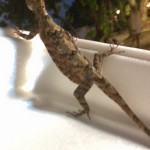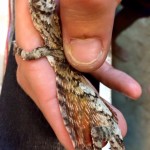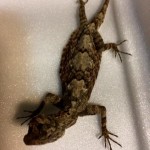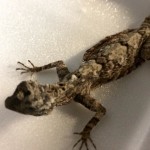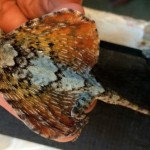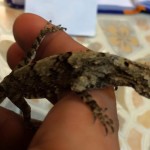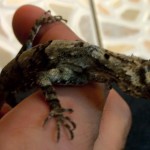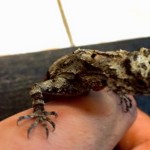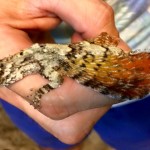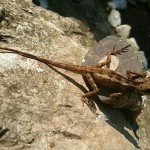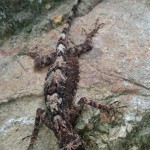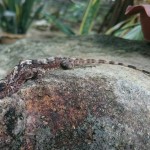King Cobra (Ophiophagus hannah)
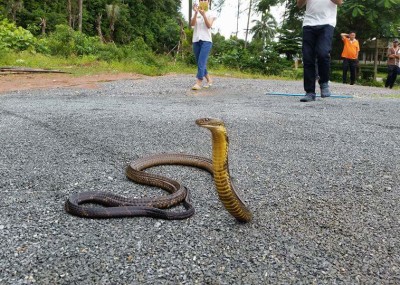
Image Copyright Stian Giordano Dahler
Last Observed: 2014
Observed By: Hans Goossens
The infamous, magnificent king cobra is the world’s longest species of venomous snake, growing in rare cases to nearly six metres in length. It isn’t that closely related to other species of cobra and instead is the sole member of its own genus.
The king cobra feeds mainly on other snakes. So if you see one you can make a fair guess that there are other snakes nearby. They are probably hiding though.
The snake is predominantly a grey-green colour with a paler belly but can also be tan or even black in colour. Juvenile snakes are totally different in appearance though being black with yellow bands across. They can be confused with the banded Krait but are distinguishable by their characteristic hood.
King cobras locate prey with an extremely attuned sense of smell, keen eyesight and a sensitivity to small vibrations in the earth.
Dangerous?
King cobras have a highly toxic venom that they inject in large quantities when they bite. And they react very aggresively when they feel threatened, adopting the characteristic cobra hood and rearing stance that displays a preparedness to strike.
But studies have revealed that their first instinct is to avoid confrontation and cases of king cobra bites are surprisingly rare, particularly so since it is so frequently encountered by people.
One piece of good advice when confronted by a provoked and aggresive king cobra is to slowly remove a hat or other piece of clothing and toss it to the ground while backing away. Then a change of shorts might be in order.
King Cobra Wikipedia
Indo-Chinese Rat Snake (Ptayas korros)
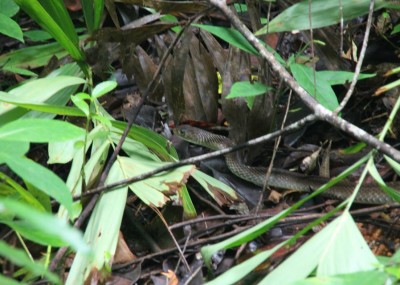
Image Copyright Hans Goossens
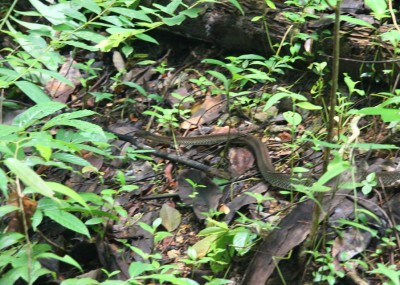
Image Copyright Hans Goossens
Last Observed: February 2016
Observed By: Hans Goossens
The Indo-Chinese Rat Snake Rat Snake, A.K.A. Chinese ratsnake is a nonvenomous snake from the colubrid family. It can grow to a length of 1.7 metres.
Indo-Chinese Rat Snake Wikipedia
Spotted Flying Dragon (Draco maculatus)
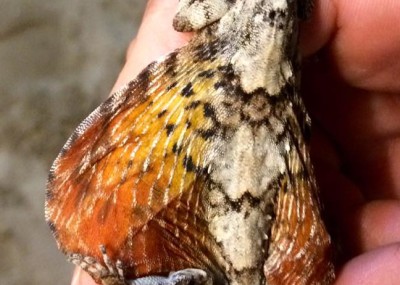
Image Copyright Michael Martin
Last Observed: February 2016 2015
Observed By: Michael Martin, Nikki Barracuda
Now the spotted flying dragon is a splendid little lizard. It doesn’t actually fly of course, but it can glide a hell of a long way from tree to tree. It does this by extending special brilliantly coloured “wings” which are flaps of skin that it makes rigid when gliding and tucks away when on the ground.
Spotted Flying Dragon Wikipedia
Image Copyright Michael Martin
Image Copyright Michael Martin
Image Copyright Michael Martin
Image Copyright Michael Martin
Image Copyright Michael Martin
Image Copyright Michael Martin
Image Copyright Michael Martin
Image Copyright Michael Martin
Image Copyright Michael Martin
Image Copyright Nikki Barracuda
Image Copyright Nikki Barracuda
Image Copyright Nikki Barracuda
Crimson Sunbird (Aethopyga siparaja)
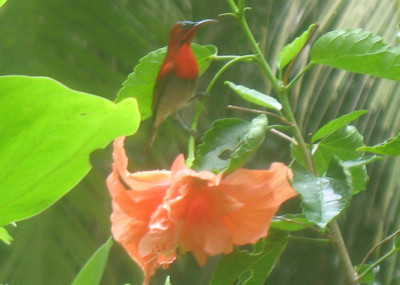
Image: Dave Hinchliffe
Last Observed: January 2009 – Koh Chang
Last Observed By: Dave Hinchliffe
The Crimson Sunbird is a member of the nectar-feeding sunbird family of birds. These tiny birds occupy a similar evolutionary niche to the better-known hummingbirds of the Americas. The look similar and have very fast-beating wings that allow them to hover and use their long bills to feed on nectar.
The adult crimson sunbird only grows up to 11cm in length and has a brilliant red colouration of head, breast and back..
Crimson Sunbird Wikipedia
Asian Palm Civet (Paradoxorus hermaphroditus)
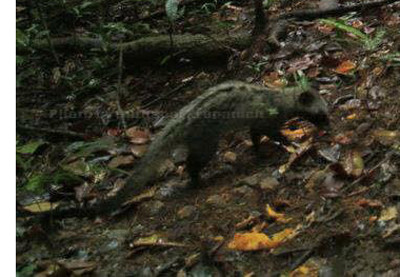
Image Copyright Suthanai Krupanich
Last Observed: Koh Chang, December 2015
Observed By: Suthanai Krupanich
The Asian palm civet is a relatively common nocturnal mammal native to Koh Chang and Southeast Asia. It inhabits a wide range of habitats and lives both in trees and on the ground so is ideally suited to koh Chang’s jungle.
Kopi Luwak
You won’t believe this. Kopi Luwak (known as Chamot in Thai) is a type of coffee prized apparently for it’s great flavour. It is made from coffee beans that have passed through the digestive system of the Asian Palm Civet. Kopi luwak is presumably Indonesian for mammal-crap coffee. You would think that pre-eaten coffee would not be a thing, but you’d be wrong. This stuff costs a fortune. And of course this has created an illegal trade in captured Asian palm civets being force-fed coffee. Good grief. Tea is nice. drink tea.
Asian Palm Civet Wikipedia
Chinese Pond Heron (Ardeola bacchus)
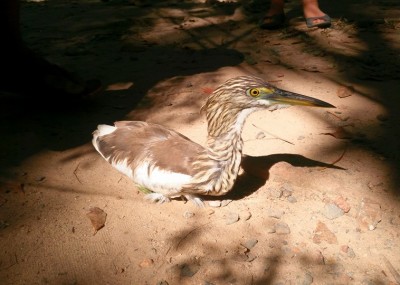
Image Copyright Paweena Khamsap
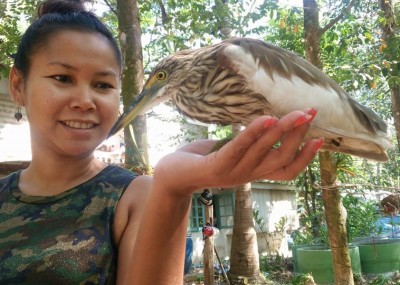
Image Copyright Paweena Khamsap
Last Observed: January 2016 – Koh Chang
Last Observed By: Paweena Khamsap
The Chinese Pond Heron is a medium sized freshwaterwater bird native to East Asia.
It has a regular plumage of white and brown feathers but it dresses up for breeding season by developing a striking red white and blue colouration.
they feed on fish, insects and crustaceans and are a relatively plentiful species.
Chinese Pond Heron Wikipedia
Asian Leaf Turtle (Cyclemis dentata)
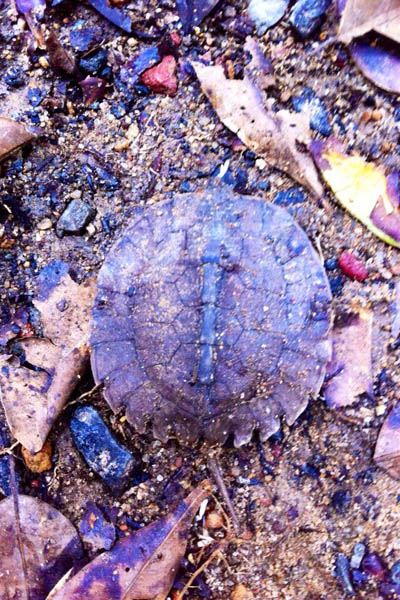
Image Copyright Nattapol Phutong
Last Observed: January 2016, Koh Chang
Observed By: Nattapol Phutong
The Asian leaf turtle is a Southeast Asian native species of turtle that is very common in the pet trade. It grows up to a maximum of 24cm in length.
Nature has some interesting defense mchanisms but the Asian leaf turtle’s is a strange one. When threatened it can squirt the contents of its digestive system. Puking on predators! Once again nature excels itself.
Asian Leaf Turtle Wikipedia
Blanford’s Bridle Snake (Dryocalamus davisonii)
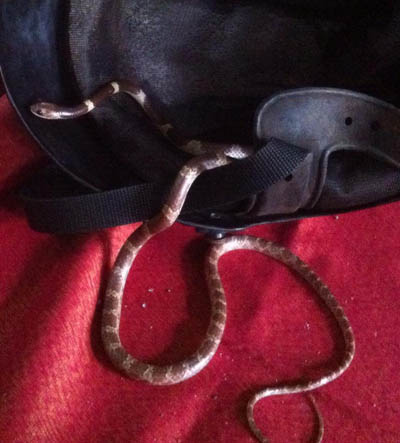
Image Copyright Heli pohjolainen
Last Observed: March 2016
Observed By: Heli Pohjolainen
Blanford’s Bridle Snake (a.k.a. the Indian Wolf Snake) is a small, non-venomous colubrid snake species that is endemic to Asia.
It is called a bridle snake due to it’s supposed resemblance to a horse’s bridle. You have to wonder if Davison, or Blanford, or whoever it was that named it had been in the jungle too long when they made that comparison.
Blanford’s Bridle Snake Wikipedia
Yellow Boxfish (Ostracion cubicus)
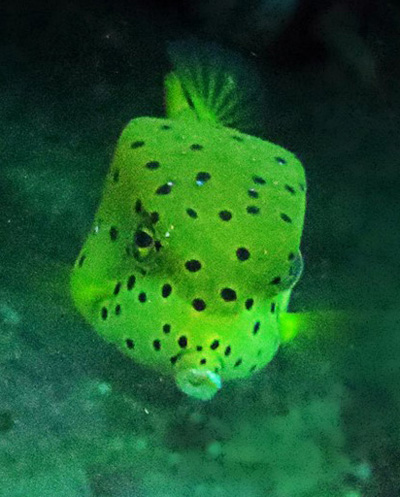
Image Copyright BB Divers
Observed: Koh Chang Reefs, December 2015
Observed By: BB Divers
The yellow boxfish is a species of boxfish that is coloured yellow. With us so far? When young they are apparently a bright and vivid yellow colour but this colour fades with age and older fish will have a blue-grey and faded yellow colour. Poor old things.
They are solitary animals but breed in spring in groups of one male and between two and four females, a thought that probably keeps them going through those dark winter months.
They are such agile swimmers that in 2006 Mercedes Benz produced a concept car based on their shape. They must have been somewhat displeased when it was later discovered that their swimming agility is more to do with the combination of fin movements with their un-aerodynamic body shape. back to the drawing board then.
Yellow Boxfish Wikipedia
Yellowback Fusilier (Caesio xanthonota)
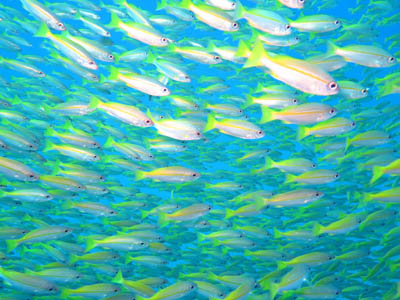
Image Copyright BB Divers
Observed: Koh Chang Reefs, December 2015
Observed By: BB Divers
The yellowback fusilier is a small fish with a pale body and a distinctive bright yellow zone on its back. They swarm in large numbers and are a common sight around Koh Chang reefs and lagoons and all over the Indian and Western Pacific Oceans.
They feed on zooplankton and are therefore planktivores, not quite vegetarians, but close.
Yellowback Fusilier Wikipedia





